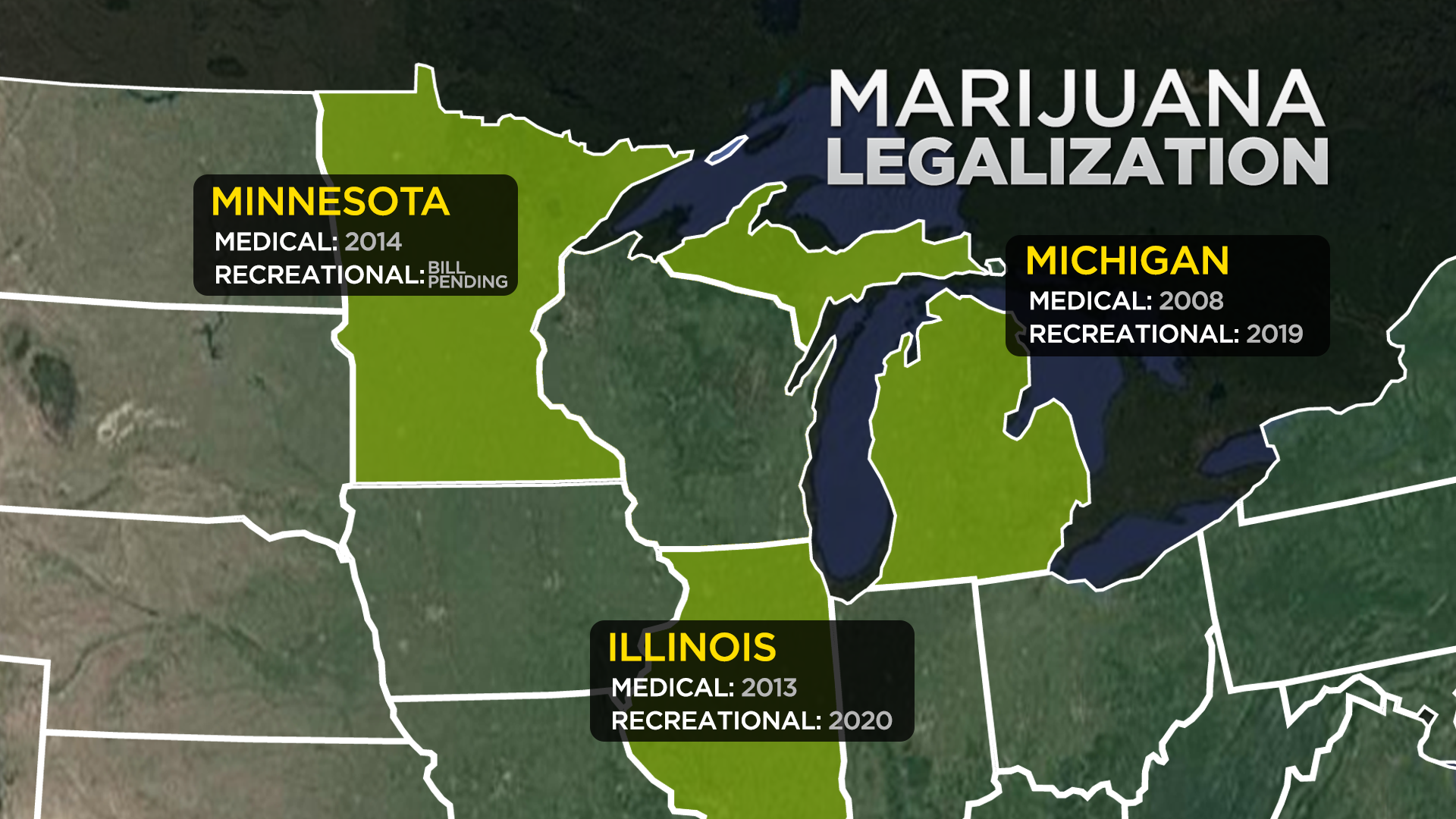New calls for marijuana legalization after report shows Wisconsinites gave Illinois $36M in tax revenue
MADISON, Wis. (CBS 58) -- Wisconsinites paid over $36.1 million in taxes attributed to marijuana sales in Illinois, according to a memo by the nonpartisan Legislative Fiscal Bureau.
State Sen. Melissa Agard (D-Madison), a longtime champion of cannabis legalization, released a copy of the report Thursday as Wisconsin lags behind neighboring states on marijuana legalization.
Sen. Agard called Wisconsin an "island of prohibition", surrounded by states that have legalized marijuana or will do so soon.
“It should upset every Wisconsinite that our hard-earned tax dollars are going across the border to Illinois," Agard said in a statement. "This is revenue that could be going toward Wisconsin’s public schools, transportation infrastructure, and public safety. Instead, Illinois is reaping the benefits of Republican obstructionism and their prohibitionist stance on marijuana legalization."
37 states have legalized medical and/or recreational marijuana, including neighboring states Michigan, Illinois, and Minnesota. And that's where Wisconsinites' money is going.
Illinois dispensaries made more than $1.5 billion in 2022. Four Illinois counties bordering Wisconsin have dispensaries. Of the nearly $240 million in sales there, more than half came from out-of-state customers.
The analysis by the Legislative Fiscal Bureau reviewed cannabis tax revenue sales by Wisconsin residents by "assuming that all sales to out-of-state residents in counties bordering Wisconsin were made to Wisconsin residents, which are estimated to constitute 7.8% of total Illinois cannabis-related tax revenue."
The $36.1 million estimate in tax revenues could be lower or higher due to several variables, the memo states.
"It is possible that not all sales to out-of-state residents in counties bordering Wisconsin were made to Wisconsin residents. For example, two of the dispensaries included in this estimate are located in Jo Daviess County, which borders both Iowa and Wisconsin. A portion of sales at those dispensaries likely were made to Iowa residents."
Michigan and Illinois have legalized cannabis for adult use, and Minnesota has created a medical cannabis program. However, Wisconsin remains an island and there's signs GOP lawmakers may be farther away from finding middle ground on medical marijuana legislation than previously thought.
Jay Selthofner, the founder of the Wisconsin Cannabis Activist Network, said, "I look at marijuana legalization as a jobs bill, because it would create another sector of our economy."
Selthofner said there's a major trickle-down effect: not only would industries benefit if marijuana was legalized, but some people are afraid to visit Wisconsin now while it's illegal. He said the message is, "Come on vacation, leave on probation. That's what the signal is right now to marijuana people."
Advocates say even just decriminalizing marijuana would be a major step forward, and a cost saver for law enforcement and court budgets throughout the state.
Selthofner said, "We have science, we have public policy, the public supports it, polling supports it."
Legalizing cannabis is popular among Wisconsin voters. A Marquette Law poll in October showed 64% of registered voters in Wisconsin favored legalizing marijuana. In 2019, the Marquette poll found 83% support marijuana for medical use.
Selthofner said, "Public perception is way ahead of the politicians."
So far Republican leadership does not support it.
Assembly Speaker Robin Vos, who for years voiced support for medical purposes, suggested during a WISN interview this year "we're not that close '' on medical marijuana.
Gov. Tony Evers again proposed recreational marijuana in his state budget proposal, but Republicans on the Joint Finance Committee have already vowed to reject the provision.
Sen. Agard said those Republicans are out of touch with what the majority of people want. She said, "It does not make us more safe, it does not help us move forward, and clearly does not match the values of the people who work and play in our state."
She said a number of Republican colleagues have told her privately they would vote for the bill if she got it to the floor, but she added, "They're hesitant to sign onto the bill and be the first person from their party to put their name on it, because there are concerns their leaders may take action against them."
We reached out to both Assembly Speaker Robin Vos' office for comment, as well as Senate Majority Leader Devin LeMahieu's office. Neither responded.
















